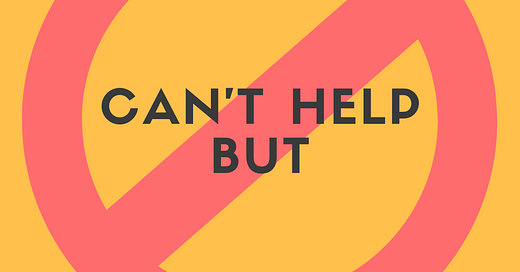My friends,
Every time I read the phrase “can’t help but,” I put a little tick in the running tally in my head. I’m up to 4 million. It is (probably) the most common phrase in the English language and my goal here today is to convince you to never use it again.1
The thing is you can! You can help but! You can help but smile! You can help but laugh! You can help but kiss the person you shouldn’t kiss! You have agency! You are (usually) in control of your actions! If it’s not you who can’t help but in your writing, you certainly can help but make your characters do those things. The reader knows you don’t mean it.
The reader knows you’re actually saying ain’t I a stinker? The reader knows you’re saying I know I/the character should not do this and/or is having a very expected reaction to something common, but instead of just saying “she smiles at the puppy” I have to say “she can’t help but smile at the puppy” so that I know that you know that I know I’m not some kind of schlocky writer. This phrase is a conversation between the writer pulling the strings and the reader watching the puppet where we all pretend the marionette is a real live boy.
You should not use this phrase in your writing. You should take it out like all or most of your really, just, almost, seems, about, kind of, etc words that are a crutch while you’re typing and thinking of the next word. “She smiles at the puppy” is an objectively better sentence than “she can’t help but smile at the puppy.”
I made a specific and concerted effort not to use use can’t help but in my book. I searched to make sure I didn’t inadvertently use it. When I find myself writing it, I immediately delete it. I never need it. It’s never essential. When I read it in a submission or published book, I roll my eyes. I would like to ban it from the English language, right alongside “trials and tribulations.” Worst cliches ever.
Keep reading with a 7-day free trial
Subscribe to Agents and Books to keep reading this post and get 7 days of free access to the full post archives.



